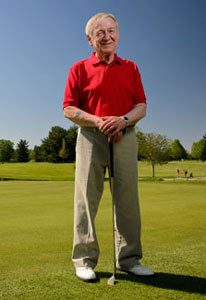
Revolutionary heart procedure gets central Illinois man back on the golf course

Gene Shurtz, 74, East Peoria, was the second central Illinois resident to undergo the innovative TAVR procedure at OSF HealthCare.
Suffering from severe aortic stenosis, but not a candidate for open-heart surgery, Gene underwent the TAVR procedure, allowing him to see a day he never thought possible.
Gene was an active East Peoria retiree who loved playing golf, had exercised regularly his entire life, and was still walking more than two miles every other day at age 74.
Then, while walking with a friend not long ago, he noticed something was wrong.
“I’d walked off and on for most of my life,” he said. “But all of a sudden it got to where I had to stop halfway to the corner of my block to rest, and that’s only three houses away. I couldn’t breathe.”
Soon, Gene couldn’t walk from his garage to his kitchen without stopping and leaning against a counter to catch his breath.
“That’s when I realized that I had a problem.”
“Mr. Shurtz suffered from severe aortic stenosis,” said one of the cardiologist with HeartCare Midwest, an affiliate of OSF HealthCare. “He desperately needed a heart valve replacement, but was not healthy enough to have his chest opened up.”
Severe aortic stenosis is a narrowing of the aortic valve opening which blocks normal blood flow. It can be caused by a birth defect, radiation therapy or can be age-related. Without treatment, half of the people who feel sick from this problem die within an average of two years.
Aortic valve replacement (AVR) through open-heart surgery is the most common treatment of severe aortic stenosis. But if doctors determine a patient is either at high risk or too sick for open-heart surgery, and if medicine is not helping, transcatheter aortic valve replacement (TAVR) may be a treatment option. TAVR is an innovative new procedure that inserts a new valve inside a patient’s diseased aortic valve and does not require the chest to be opened. This procedure is intended only for patients with age-related aortic stenosis.
Due to his age and deteriorating condition, it was determined that Gene was a suitable TAVR candidate. Gene Shurtz was about to become only the second Central Illinois resident to undergo the procedure.
“I was told it hadn’t been done in Peoria,” Gene said.
The procedure went flawlessly, and soon Gene was back doing the things he loves most.
“It’s a miracle,” he said. “I feel like I’m 20 years old again. I do what I want to do, and I am certainly enjoying myself and my life again.”
The OSF Heart Valve team is an elite group of cardiologists and surgeons trained and experienced in a variety of new procedures making valve repair and replacement more routine. The TAVR teams of Peoria and Rockford have been instrumental in bringing this latest technology to the region and have successfully screened and treated many patients. OSF Saint Francis Medical Center in Peoria and OSF Saint Anthony Medical Center in Rockford currently provide the new TAVR procedure.
This less invasive procedure is done through a small incision in the groin using a catheter to transport the valve to the heart and then position into place without any incision in the chest wall. The TAVR procedure is designed to replace a patient’s diseased aortic valve without the use of a heart-lung machine. TAVR patients must have serious medical issues in order to qualify for the procedure and are first carefully monitored and evaluated by the physician team.
While up to 1.5 million people in the U.S. suffer from aortic stenosis, approximately 500,000 within this group of patients suffer from severe aortic stenosis. If you have severe aortic stenosis and are too sick for open heart surgery and if medicine is not helping you feel better, you may be eligible for TAVR. OSF cardiologists will do a comprehensive evaluation to determine if the procedure is an appropriate treatment option.
Call 800-352-4410 in Peoria, or 815-398-3000 in Rockford, or visit OSF online to schedule a consultation.
Gene Shurtz is glad he did.
“Before, I had a death sentence. Now, I have a life, thanks to OSF Saint Francis Medical Center and their heart team,” Gene said.